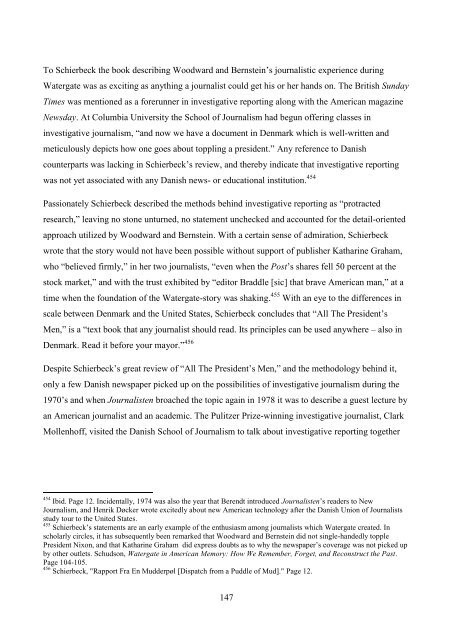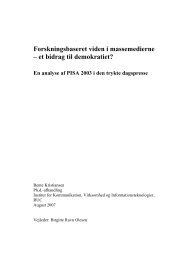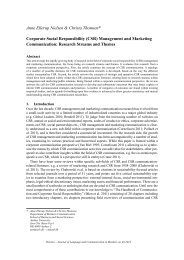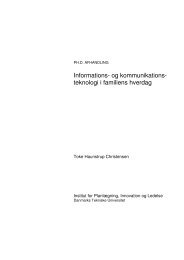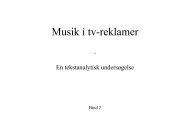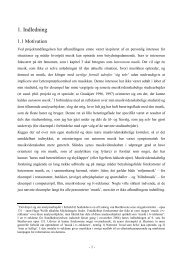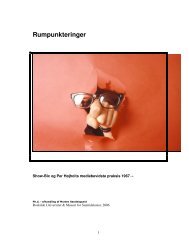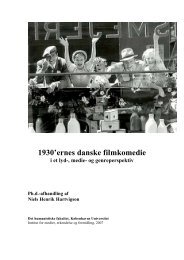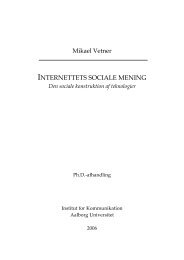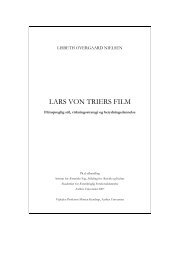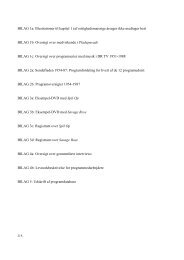The Jeremiad Over Journalism
The Jeremiad Over Journalism
The Jeremiad Over Journalism
You also want an ePaper? Increase the reach of your titles
YUMPU automatically turns print PDFs into web optimized ePapers that Google loves.
To Schierbeck the book describing Woodward and Bernstein‘s journalistic experience during<br />
Watergate was as exciting as anything a journalist could get his or her hands on. <strong>The</strong> British Sunday<br />
Times was mentioned as a forerunner in investigative reporting along with the American magazine<br />
Newsday. At Columbia University the School of <strong>Journalism</strong> had begun offering classes in<br />
investigative journalism, ―and now we have a document in Denmark which is well-written and<br />
meticulously depicts how one goes about toppling a president.‖ Any reference to Danish<br />
counterparts was lacking in Schierbeck‘s review, and thereby indicate that investigative reporting<br />
was not yet associated with any Danish news- or educational institution. 454<br />
Passionately Schierbeck described the methods behind investigative reporting as ―protracted<br />
research,‖ leaving no stone unturned, no statement unchecked and accounted for the detail-oriented<br />
approach utilized by Woodward and Bernstein. With a certain sense of admiration, Schierbeck<br />
wrote that the story would not have been possible without support of publisher Katharine Graham,<br />
who ―believed firmly,‖ in her two journalists, ―even when the Post‘s shares fell 50 percent at the<br />
stock market,‖ and with the trust exhibited by ―editor Braddle [sic] that brave American man,‖ at a<br />
time when the foundation of the Watergate-story was shaking. 455 With an eye to the differences in<br />
scale between Denmark and the United States, Schierbeck concludes that ―All <strong>The</strong> President‘s<br />
Men,‖ is a ―text book that any journalist should read. Its principles can be used anywhere – also in<br />
Denmark. Read it before your mayor.‖ 456<br />
Despite Schierbeck‘s great review of ―All <strong>The</strong> President‘s Men,‖ and the methodology behind it,<br />
only a few Danish newspaper picked up on the possibilities of investigative journalism during the<br />
1970‘s and when Journalisten broached the topic again in 1978 it was to describe a guest lecture by<br />
an American journalist and an academic. <strong>The</strong> Pulitzer Prize-winning investigative journalist, Clark<br />
Mollenhoff, visited the Danish School of <strong>Journalism</strong> to talk about investigative reporting together<br />
454 Ibid. Page 12. Incidentally, 1974 was also the year that Berendt introduced Journalisten‘s readers to New<br />
<strong>Journalism</strong>, and Henrik Døcker wrote excitedly about new American technology after the Danish Union of Journalists<br />
study tour to the United States.<br />
455 Schierbeck‘s statements are an early example of the enthusiasm among journalists which Watergate created. In<br />
scholarly circles, it has subsequently been remarked that Woodward and Bernstein did not single-handedly topple<br />
President Nixon, and that Katharine Graham did express doubts as to why the newspaper‘s coverage was not picked up<br />
by other outlets. Schudson, Watergate in American Memory: How We Remember, Forget, and Reconstruct the Past.<br />
Page 104-105.<br />
456 Schierbeck, "Rapport Fra En Mudderpøl [Dispatch from a Puddle of Mud]." Page 12.<br />
147


